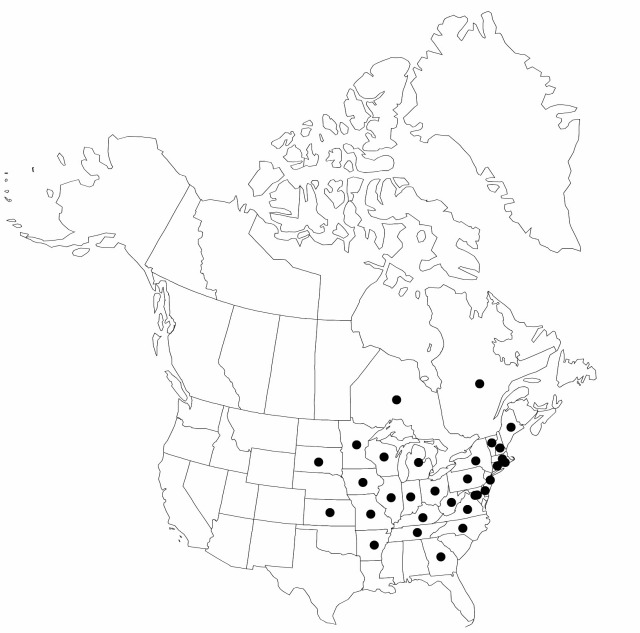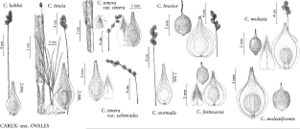Difference between revisions of "Carex normalis"
Bull. Torrey Bot. Club 37: 244. 1910.
imported>Volume Importer |
imported>Volume Importer |
||
| Line 59: | Line 59: | ||
|publication year=1910 | |publication year=1910 | ||
|special status=Illustrated;Endemic | |special status=Illustrated;Endemic | ||
| − | |source xml=https:// | + | |source xml=https://bitbucket.org/aafc-mbb/fna-data-curation/src/2e0870ddd59836b60bcf96646a41e87ea5a5943a/coarse_grained_fna_xml/V23/V23_657.xml |
|genus=Carex | |genus=Carex | ||
|section=Carex sect. Ovales | |section=Carex sect. Ovales | ||
Latest revision as of 20:42, 5 November 2020
Plants cespitose in clumps of fewer than 40 culms. Culms erect, 35–140 cm; vegetative culms few, inconspicuous, usually fewer than 12 leaves, not strikingly 3-ranked, leaves clustered at apex. Leaves: sheaths usually with white intervenal areas abaxially, conspicuously green-veined adaxially nearly to collar, Y-shaped hyaline area at collar, adaxially firm, summits truncate and prolonged to 2 mm beyond collar, rounded, proximal sheath loose, smooth; distal ligules 2–5.5 mm; blades 3–7 per fertile culm, 20–65 cm × 2.2–6(–6.5) mm. Inflorescences erect to arching, compact to open, green, 1.5–5 cm × 5–16 mm; proximal internode 3.5–10(–11.5) mm; 2d internode 2–8 mm; proximal bracts scalelike with bristle tips shorter than or equaling inflorescences. Spikes 4–10, overlapping to distinct, globose to ellipsoid, 7–13 × 4–7 mm, base rounded or occasionally tapered, apex obtuse to rounded. Pistillate scales white-hyaline, with green midstripe, ovate, 2.1–3.3 mm, much shorter by 0.7–1.6 mm and narrower than perigynia, margins hyaline or pale, sometimes involute, apex obtuse to acute. Perigynia 15–80 on larger spikes, spreading, green distally, conspicuously 4+-veined on each face, narrowly to broadly ovate, plano-convex, 2.7–4.1 × 1.3–2.3 mm, 0.35–0.5 mm thick, margin flat, including wing 0.25–0.45 mm wide, smooth; beak pale green at tip, flat, ciliate-serrulate, abaxial suture with conspicuous white-hyaline margin, distance from beak tip to achene 1.2–2.2 mm. Achenes elliptic, 1.3–1.6 × 0.9–1.2 mm, 0.35–0.5 mm thick. 2n = 68.
Phenology: Fruiting early summer.
Habitat: Open, often wet, woods, thickets, meadows, and roadsides
Elevation: 0–1600 m
Distribution

Ont., Que., Ark., Conn., Del., D.C., Ga., Ill., Ind., Iowa, Kans., Ky., Maine, Md., Mass., Mich., Minn., Mo., N.H., N.J., N.Y., N.C., Ohio, Pa., R.I., S.Dak., Tenn., Vt., Va., W.Va., Wis.
Discussion
Selected References
None.
